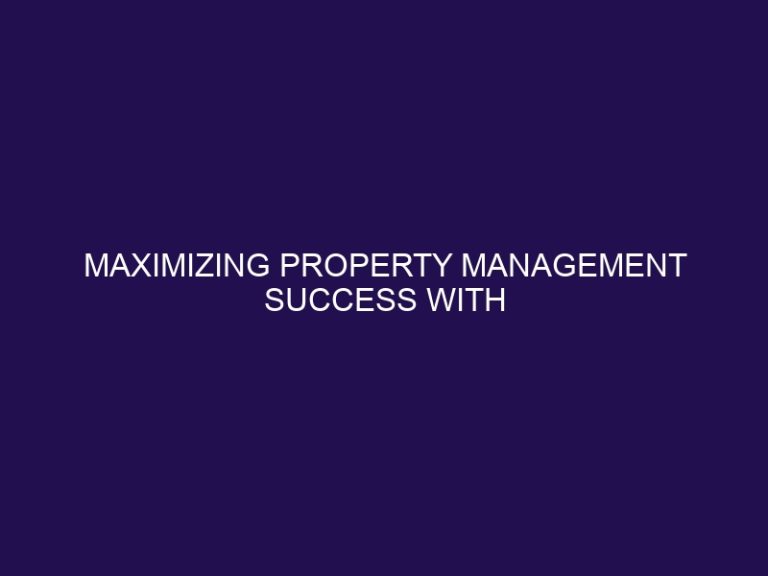Secure Your Real Estate Investments with Effective Risk Management
Real estate investments can offer lucrative opportunities for investors, but they also come with inherent risks. Understanding and effectively managing these risks is crucial for protecting your investments and achieving long-term stability in the real estate market.
In this comprehensive guide, we’ll explore the various aspects of risk management in real estate, from identifying potential risks and implementing mitigation strategies to leveraging insurance solutions and navigating legal considerations. We’ll also delve into the importance of financial planning, market trends, and professional services in real estate risk management. Through case studies and practical insights, we’ll highlight successful strategies for building a resilient real estate investment portfolio.
We’ll discuss the role of transparency, compliance, technology, and education in mitigating risks and adapting to dynamic market changes. Whether you’re a seasoned investor or new to the real estate landscape, this article aims to equip you with the knowledge and tools necessary to safeguard your investments and thrive in the real estate market.
Key Takeaways:
Risk Management in Real Estate: Protecting Your Investments
Risk management in real estate is a critical aspect of safeguarding your property investments, ensuring long-term stability and resilience in the ever-evolving market.
Within the real estate industry, risk management encompasses a wide range of strategies aimed at identifying, assessing, and mitigating potential threats to property values and investments. Through thorough risk assessment and proactive measures, property owners and investors can protect themselves from uncertainties such as market fluctuations, property damage, or legal disputes.
Implementing risk management practices not only safeguards current holdings but also maintains the potential for future growth and profitability in the real estate market.
Introduction to Real Estate Risk Management
Introduction to real estate risk management involves understanding the dynamic nature of property investments and the strategies employed to mitigate potential risks in a rapidly changing market environment.
Property investments are subject to various risks such as market volatility, regulatory changes, and unexpected economic downturns. Real estate risk management aims to assess these potential threats and develop strategies to minimize their impact on investment returns. It involves thorough analysis of property performance, market conditions, and financial metrics to make informed decisions.
Risk management techniques could include diversification of portfolio, insurance coverage, and careful selection of investment opportunities. This dynamic field requires continuous monitoring and adaptation to ensure the optimal protection of real estate assets.
Understanding the Risks in Real Estate Investments
Understanding the risks in real estate investments is essential for identifying potential challenges and opportunities within the property market, allowing investors to make informed decisions.
One of the key risks in real estate investments is market fluctuations, which can significantly impact the value of properties. Economic factors such as inflation and interest rates also pose potential threats, affecting both property prices and demand.
Regulatory changes, such as zoning laws and property tax policies, can introduce uncertainties for investors. It’s important to consider these factors when assessing the potential risks and rewards of real estate investments, to develop a well-rounded investment strategy and minimize potential pitfalls.
Importance of Protecting Your Real Estate Investments
The importance of protecting your real estate investments cannot be overstated, as it ensures the preservation of property value, financial stability, and long-term growth potential.
Real estate investments are not only valuable assets but also serve as a means of securing your financial future. By safeguarding these investments, you are effectively mitigating risks associated with market fluctuations and ensuring a stable source of long-term wealth accumulation.
Preservation of property value contributes to the overall asset appreciation and offers a steady stream of income through rental or resale opportunities. Long-term growth potential is essential for building equity and securing your financial standing, making it vital to actively protect and nurture your real estate portfolio.
Effective Strategies for Risk Management in Real Estate
Implementing effective strategies for risk management in real estate is crucial for protecting investments, adapting to market dynamics, and maximizing returns for the investor.
One essential element of a robust risk management strategy is conducting thorough market research and analysis to identify potential risks and opportunities in real estate investment. By staying informed about market trends, regulatory changes, and economic indicators, investors can make more informed decisions and mitigate potential downside risks.
Diversification of real estate portfolios across different asset classes, locations, and investment types can help spread risk and reduce vulnerability to market fluctuations. This approach not only safeguards the investment but also offers opportunities for enhanced returns by capitalizing on different market conditions.
Adopting a proactive approach to risk management involves establishing clear risk tolerance levels and implementing contingency plans to address unforeseen events. This allows investors to navigate unexpected challenges and mitigate their impact on investment performance, ultimately safeguarding their financial interests.
Assessing Potential Risks in Real Estate Investments
Assessing potential risks in real estate investments involves a comprehensive evaluation of market trends, inventory dynamics, and regulatory factors to identify potential challenges and opportunities for investors.
Understanding the fluctuations in market trends is crucial as it gives insights into the demand-supply balance, price dynamics, and market sentiment. Analyzing inventory dynamics helps in gauging the availability of properties and the potential impact on pricing and investment returns.
Regulatory factors such as zoning laws, property taxes, and development regulations play a significant role in determining the risk profile of a real estate investment. By integrating these elements into the assessment, investors can make informed decisions and mitigate potential risks in the market.
Implementing Risk Mitigation Techniques in Real Estate
Implementing risk mitigation techniques in real estate involves proactive measures to address potential challenges, ensure legal compliance, and safeguard the investor’s bottom line in property ventures.
These techniques encompass a range of strategies, such as thorough due diligence in property assessments to identify potential risks, the development of comprehensive risk management plans, and contingency planning for unforeseen events.
Adhering to industry best practices and compliance with regulatory requirements play a crucial role in mitigating risks associated with real estate investments. Leveraging insurance coverage and utilizing legal expertise further fortify the investor’s position against potential liabilities.
Insurance Solutions for Real Estate Investments
Insurance solutions for real estate investments provide a layer of protection against unforeseen events, offering investors peace of mind and financial security in their property portfolios.
Within the realm of real estate investments, insurance solutions play a pivotal role in safeguarding assets and mitigating risks associated with property ownership. By securing appropriate coverage, investors can shield themselves against potential liabilities, such as property damage, natural disasters, or legal disputes.
Insurance solutions also contribute to legal compliance, ensuring that investors meet the necessary requirements and regulations for property protection. Therefore, integrating insurance coverage into real estate investments is essential for upholding investor security and fortifying their financial well-being.
Legal Considerations for Protecting Real Estate Investments
Navigating the legal landscape is essential for protecting real estate investments, ensuring compliance with regulations, and safeguarding the interests of the investor in property transactions.
Real estate investors need to be mindful of property laws, zoning regulations, and tax considerations to mitigate risks and ensure a smooth investment process. Proper legal due diligence can help in identifying any potential issues related to property ownership, environmental regulations, and land use restrictions.
Establishing a clear legal structure, such as forming a limited liability company or establishing a trust, can provide asset protection, tax benefits, and liability shielding for real estate investments.
Financial Planning for Real Estate Risk Management
Strategic financial planning is integral to effective risk management in real estate, enabling investors to navigate market fluctuations, optimize resource allocation, and achieve long-term financial goals.
Through financial planning, real estate investors can effectively mitigate potential risks and uncertainties inherent in the market. By strategically allocating resources, investors can seek to minimize financial losses and enhance the return on investment. By setting clear financial goals and timelines, individuals can establish a roadmap for long-term wealth accumulation and sustainable growth.
Financial strategies play a crucial role in balancing risk and reward in the real estate sector. They enable investors to diversify their portfolios, leverage opportunities, and optimize the utilization of available resources. This proactive approach fosters a more comprehensive understanding of market dynamics and positions investors to make informed decisions aligned with their long-term financial objectives.
Real Estate Market Trends and Risk Management
Understanding real estate market trends is crucial for effective risk management, as it allows investors to adapt their strategies, capitalize on opportunities, and navigate potential challenges in the market.
By keeping a close eye on the real estate market trends, investors can identify shifts in demand and supply, fluctuations in property prices, and emerging investment hotspots. These insights are invaluable for devising investment strategies that not only maximize returns but also minimize risk exposure.
Being attuned to market dynamics enables well-considered choices when it comes to diversifying property portfolios, be it through geographical expansion or asset class allocation.
Professional Services for Real Estate Risk Management
Engaging professional services for real estate risk management provides investors with specialized expertise, personalized strategies, and tailored solutions to address the unique challenges of property ventures, particularly for small businesses.
Professional experts in real estate risk management leverage their in-depth knowledge and understanding of the market to offer comprehensive analysis, risk assessment, and mitigation. Their guidance and support are invaluable in navigating the complexities of property investments, ensuring clients make informed decisions that align with their financial objectives.
With their assistance, small businesses can develop sound risk management plans, enhance their operational resilience, and optimize their investment portfolio for sustainable growth.
Case Studies on Successful Real Estate Risk Management
Exploring case studies on successful real estate risk management offers valuable insights into effective strategies, adaptive measures, and the impact of risk management practices in diverse property investment scenarios.
These case studies showcase the pivotal role of thorough due diligence in pre-investment risk assessment, the implementation of innovative insurance solutions, and the utilization of advanced technology for monitoring and mitigating potential risks. Notable examples highlight the dynamic nature of risk management, emphasizing continuous evaluation and adjustments to align with market fluctuations, regulatory changes, and unforeseen events.
Understanding these successful cases provides a roadmap for real estate professionals to navigate challenges and optimize their risk management approach.
Transparency and Compliance in Real Estate Risk Management
Transparency and compliance form the cornerstone of real estate risk management, fostering trust, accountability, and ethical conduct in property transactions, benefiting both investors and the broader market.
Transparent practices in real estate risk management not only enhance trust among investors but also contribute to the overall stability of the real estate market. By adhering to compliance standards and regulations, industry professionals can instill confidence in potential investors by demonstrating a commitment to ethical conduct and accountability.
Technology and Tools for Real Estate Risk Assessment
Leveraging advanced technology and specialized tools enhances the precision and efficiency of real estate risk assessment, enableing investors to make data-driven decisions and adapt to market dynamics with confidence.
With the integration of big data analytics and machine learning algorithms, real estate professionals can now process enormous volumes of information swiftly, allowing for more accurate risk evaluation. Virtual property tours, augmented reality, and virtual staging have revolutionized the way properties are showcased, enabling potential buyers to explore and visualize spaces remotely, reducing the need for physical visits and accelerating decision-making processes.
These technological advancements not only streamline the assessment process but also contribute to a more agile and adaptive real estate market.
Training and Education for Real Estate Investors on Risk Management
Providing comprehensive training and education on risk management enables real estate investors with the knowledge, skills, and confidence to navigate challenges, seize opportunities, and achieve sustainable success in the property market.
Through well-structured educational programs, investors can learn effective risk assessment techniques, strategic planning, and financial analysis, enabling them to make informed decisions and mitigate potential pitfalls.
By gaining insights into market trends, legal aspects, and industry regulations, investors can develop a proactive approach towards risk mitigation, enhancing their ability to protect their investments and optimize returns.
By enableing investors with extensive knowledge and practical skills, educational initiatives contribute to a more resilient and informed real estate market, fostering growth, innovation, and responsible investment practices.
Measuring and Monitoring Risks in Real Estate Investments
Measuring and monitoring risks in real estate investments involves the systematic evaluation of market dynamics, property performance, and regulatory changes to ensure proactive risk management and well-considered choices for investors.
By employing sophisticated market monitoring tools, investors can gather real-time data on supply and demand trends, price movements, and economic indicators. This data helps in identifying potential risks such as market saturation, fluctuating property values, or changing customer preferences.
In-depth property performance analysis delves into occupancy rates, lease expirations, and market comparables to gauge the financial health and potential vulnerabilities of real estate assets. Staying abreast of regulatory changes regarding zoning regulations, tax laws, and environmental policies is crucial for understanding legal and compliance risks that may impact investment returns.
Adapting to Change: Real Estate Risk Management in Dynamic Markets
Adapting to change is essential for real estate risk management in dynamic markets, as it requires the evolution of strategies, the embrace of innovation, and the proactive response to market shifts to ensure investor success and sustainable growth.
Real estate markets operate in a constantly shifting landscape, necessitating a fluid approach that prioritizes anticipation of market dynamics and swift adaptation to emerging trends. Embracing technology, diversifying investment portfolios, and actively engaging with data-driven insights are critical components of effective risk management in this environment.
It’s imperative to integrate flexible risk strategies that can navigate diverse market conditions, allowing for resilience and sustained performance across various economic cycles.
Building a Resilient Real Estate Investment Portfolio
Building a resilient real estate investment portfolio requires strategic diversification, risk-aware decision-making, and the incorporation of adaptive strategies to withstand market fluctuations and deliver sustainable returns for the investor.
Strategic diversification involves spreading investment across different types of properties, locations, and markets to minimize risk and optimize potential returns. This may include residential, commercial, and industrial properties, as well as diversifying across regions and asset classes.
Risk-aware decision-making entails thorough research, analysis, and understanding of market dynamics, economic indicators, and regulatory changes. Engaging in due diligence and incorporating risk management strategies is crucial to mitigating potential downsides.
Integrating sustainable practices and green building technologies into real estate investments is essential for long-term viability and resilience. Investing in properties that embrace energy efficiency, environmental sustainability, and wellness features not only enhances the portfolio’s value but also contributes to a more sustainable future.
Conclusion: Achieving Long-Term Stability in Real Estate Investments
Achieving long-term stability in real estate investments requires a proactive approach to risk management, strategic decision-making, and the continuous adaptation to market dynamics, ensuring sustainable growth and investor success.
Effective risk management involves identifying potential threats such as market fluctuations, regulatory changes, and environmental impacts, and implementing strategies to mitigate these risks. Strategic decision-making encompasses thorough market analysis, diversification strategies, and leveraging emerging opportunities.
The integration of advanced technology tools for data analysis, automated reporting, and predictive modeling further enhances the effectiveness of risk management and decision-making processes. Fostering a culture of innovation and agile response to market shifts is crucial in maintaining a competitive edge.
By aligning these key elements, real estate investors can position themselves to capitalize on growth opportunities and navigate potential challenges, establishing a resilient and lucrative portfolio.
Frequently Asked Questions
What is “risk management” in real estate?
“Risk management” is the process of identifying, assessing, and controlling potential risks that may affect a real estate investment. It involves analyzing potential hazards and implementing strategies to minimize or mitigate their impact on the investment.
Why is risk management important in real estate?
Risk management is crucial in real estate because it helps investors protect their investments from potential threats that could result in financial loss. By identifying and addressing risks early on, investors can make more informed decisions and reduce the likelihood of encountering costly problems in the future.
What are some common risks in real estate?
Some common risks in real estate include market fluctuations, unforeseen expenses, natural disasters, legal issues, and tenant defaults. These risks can have a significant impact on an investment’s profitability if not properly managed and mitigated.
How can I mitigate risks in my real estate investments?
There are several ways to mitigate risks in real estate investments, including thorough due diligence, diversification, obtaining insurance, creating contingency plans, and working with experienced professionals. It’s important to assess each risk and develop a strategy to minimize its potential impact on your investment.
Should I consider hiring a risk management professional for my real estate investments?
Hiring a risk management professional can be a smart decision, especially if you are new to real estate investing or have a large portfolio. These professionals have the expertise and experience to help you identify potential risks, develop strategies to mitigate them, and provide guidance on how to protect your investments.
How often should I review and update my risk management plan for my real estate investments?
It’s important to regularly review and update your risk management plan for your real estate investments. This can be done annually or whenever significant changes occur, such as market fluctuations or major renovations. By regularly evaluating and adjusting your plan, you can ensure your investments are adequately protected from potential risks.







